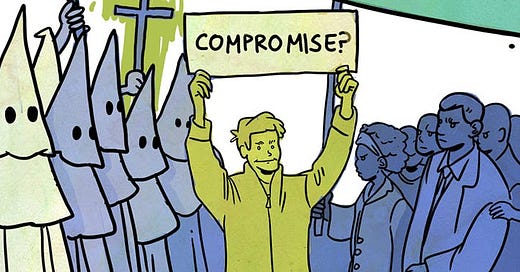The Fundamental Fiction of Being Apolitical
Part I: Rationalizing the Path of Least Resistance
I can’t remember the first time I had the thought, in as many words, that a person who describes themselves as “apolitical” is a coward at best, and a power-hungry authoritarian at worst. But I do remember, as early as early as the mid-aughts, feeling a bit off whenever someone told me they didn’t engage in or pay attention to politics. It was like my instincts regarded the position as a red flag, even if I couldn’t fully articulate why.
I was spending a lot of time in Russia in those years. Many Russians identify as essentially apolitical and, if they’re the type who like to be edgy, cynical. Given Russian history and contemporary realities, Russian cynicism is easy to understand. In the case in question, however, it was an American expat who told me she didn’t really pay attention to politics, and for reasons I couldn’t immediately articulate, that rubbed me the wrong way. (These days, I’m all too aware that the worst expats will “I’m not political” themselves all the way into supporting the most egregious abuses of authoritarian regimes. If you are very good at this game, you become basically Paul Manafort.)
One reason this woman’s declaration of political apathy in ca. 2007 didn’t sit right with me was undoubtedly that that my childhood socialization involved heavy politicization—for the Christian Right, of course, with the politics I was expected to espouse and pursue lining up with the illiberal goals for American governance that they are currently achieving at an alarming rate.
As my own political (and personal) awakenings continued, I moved further and further left, and became more and more outspoken on matters such as universal healthcare and LGBTQ rights. With that in mind, I’m pretty sure the other reason I found the comment off-putting was that on some level I was beginning to understand instinctively that political apathy isn’t innocent. It protects power.
Of course, when you’re raised to be a culture warrior and your ideological worldview falls apart, you don’t stop being a culture warrior—you switch sides. If you’re not careful to give plenty of time to reflective self-work and learning from those whose life experiences have been very different from your own, you can easily end up perpetuating the same structural flaws and oppressive norms you internalized as a kid under a new ideological cover, not to mention running from one god that fails to another, and another, and another.
Now, this is not to say that neither ideology nor words matter. They do, and I am going to spend much of this essay precisely unpacking the power of words. Words do things, and if I didn’t believe that it would be pretty silly for me to be a writer—unless, of course, I were self-consciously cynical and lacking in conviction.
But if that were the case, I’d be making a mint off of the Right’s free-flowing wingnut welfare as a Claremont fellow or the like, writing up viral fascist drivel for The Federalist or some equally repulsive publication. I write out of conscience and conviction, and I choose writing not only because it comes relatively naturally to me, but also because I believe that words can provide valuable information, convey thoughts and values in a way that sparks thinking in others, and, at least occasionally, even change people’s minds.
When you have millions of white Christian families across America instilling conflict aversion in their children from birth, what you have is a powerful engine for the preservation of white supremacist patriarchy.
By the same token, of course, words can obscure. And our rationalizations for unethical behavior, which we form out of words, can at times be so convincing that we even begin to believe them ourselves.
Keep reading with a 7-day free trial
Subscribe to The Bugbear Dispatch to keep reading this post and get 7 days of free access to the full post archives.



